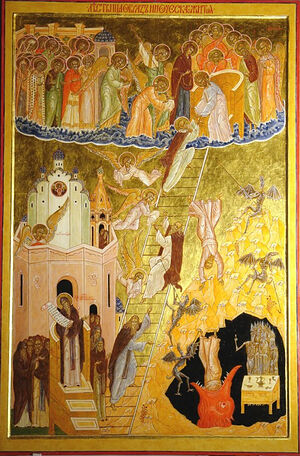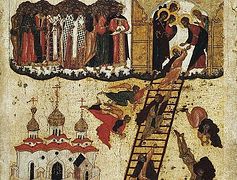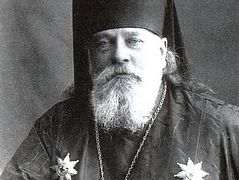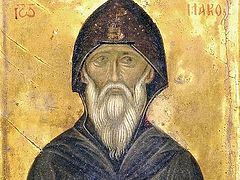 Today, a ladder unfolds before our eyes beloved brethren. This is the Fourth Sunday of the Lenten Fast, which we have reached after passing “through” the preceding Sunday, the Veneration of the Precious Cross. Those who uphold the life of the Cross find the tools by which to do so on this Sunday. This Sunday of the Ladder of Divine Ascent, the Church initiates us into the mysteries of ascesis and bodily mortification which are presented to us in the work of our Father among the Saints John, Abbot of Sinai, writer of “The Ladder.” St. John wrote the Ladder of Divine Ascent as a guide for monastics and all Christians who wish to ascend to Paradise. The Ladder is divided into thirty steps—which for the literary purposes of the book are chapters having as their subject matter either a particular passion or virtue, the avoidance or acquisition of which is described. Much can be said about the Ladder and many sermons could be written not only on each of the thirty chapters, but also on specific subsections within. We could not possibly exhaust the well of wisdom which is the Ladder of Divine Ascent. From the onset, St. John describes for us the categories of people that exist within the created order:
Today, a ladder unfolds before our eyes beloved brethren. This is the Fourth Sunday of the Lenten Fast, which we have reached after passing “through” the preceding Sunday, the Veneration of the Precious Cross. Those who uphold the life of the Cross find the tools by which to do so on this Sunday. This Sunday of the Ladder of Divine Ascent, the Church initiates us into the mysteries of ascesis and bodily mortification which are presented to us in the work of our Father among the Saints John, Abbot of Sinai, writer of “The Ladder.” St. John wrote the Ladder of Divine Ascent as a guide for monastics and all Christians who wish to ascend to Paradise. The Ladder is divided into thirty steps—which for the literary purposes of the book are chapters having as their subject matter either a particular passion or virtue, the avoidance or acquisition of which is described. Much can be said about the Ladder and many sermons could be written not only on each of the thirty chapters, but also on specific subsections within. We could not possibly exhaust the well of wisdom which is the Ladder of Divine Ascent. From the onset, St. John describes for us the categories of people that exist within the created order:
The irreligious man is a mortal being with a rational nature, who of his own free will turns his back on life and thinks of his own Maker, the ever-existent, as non-existent. The lawless man is one who holds the law of God after his own depraved fashion, and thinks to combine faith in God with heresy that is directly opposed to Him. The Christian is one who imitates Christ in thought, word and deed, as far as is possible for human beings, believing rightly and blamelessly in the Holy Trinity. The lover of God is he who lives in communion with all that is natural and sinless, and as far as he is able neglects nothing good. The continent man is he who in the midst of temptations, snares and turmoil, strives with all his might to imitate the ways of Him who is free from such. The monk is he who within his earthly and soiled body toils towards the rank and state of the incorporeal beings.
We may be called Christians, or we may be called lovers of God, or continent men and women, or ascetics only if we apply what we heard in today’s Gospel. Those who do not believe in Christ and His Gospel and those who do not obey His Church are described in the first two categories: the irreligious man (atheists) and the lawless man, who are Orthodox Christians and heretics who interpret Scripture and the teachings of Holy Orthodoxy on an ad-hoc basis. They could not be bothered with genuine sacrifice and ascesis as taught in the Ladder. Much less could they mortify their desires and lusts and sinful dispositions. St. John in his Ladder implies that at the end of time, God will reveal the truth about all men. So let us not boast of membership in the Orthodox Church or clerical status lest we be found hypocrites, who are sent off to damnation as we hear the words, I never knew you, from our Saviour.
Today, at the Divine Liturgy, the Gospel reading is intimately connected with St. John’s Ladder. In essence, today’s Gospel read at the Liturgy is a synopsis of the entire Ladder of Divine Ascent.
There is a father who approaches Christ, in today’s Gospel, seeking healing for his demoniac-possessed son. The poor father is perplexed. Having approached Christ’s disciples he quickly ascertains that they are powerless before his predicament. Christ does two things here: the first is that He sets prayer and fasting as the prerequisites for any good work. And the second is that genuine faith is revealed to be the key of all miracles. Do you believe, Christ asks the father, and our Lord continues: All things are possible for them that believe. Yet, if we examine our conscience will see we neither pray, nor do we fast, nor we genuinely believe. Faithlessness and carelessness and shallowness are the markers of modern man’s spirituality. There is no patience for proper prayer, never mind fasting; there is no search for genuine faith. All things are relative and subjective, because the society we exist in makes man a god and enshrines him with rights and prerogatives. Yet, such a view is foreign to the Gospel and certainly not to be found in the Ladder of Divine Ascent. Can we apply true prayer and fasting? Then, we will climb ladders and cast out demons and perhaps even work miracles as promised by Christ. Concerning today’s Gospel, St. John of Kronstadt reminds us: "Do you see what power the Lord gives to faith and to the faithful?” It is the genuine Christian disposition that counts here. No amount of pretentious fasting or pretentious praying can outwit Him who behold the hearts of men and grants an incorruptible crown. With these brief thoughts in mind, let us delve into the mystery of each soul’s ascent of the Ladder.
The key to Faith is obvious. It is prayer. It is meeting Christ in prayer, in genuine conversation with the Father which occurs within the sacrificial Christian heart of each one. This is where we obtain intimate knowledge of the Kingdom, by humility and sacrifice and ascesis. Pure fasting, and not a ritualistic diet, is the logical outcome of such a life. Yet I may only properly live in such a manner if I incarnate the Gospel, by activity and action. And this means to incarnate the Gospel via meeting Christ in the Sacraments, as I have emphasized prior. The Sacraments exist in the Church Christ established, so I must root myself in the Church Christ established. None of what follows makes sense if I am living an “online Orthodoxy” divorced of context and a tangible parish existence. The chief prerequisite to the Sacraments is repentance. And repentance is lauded in The Ladder. Behold, the interconnectivity of the Faith’s maxims within Orthodoxy. I must turn from my evil ways to live, I must put to death the old man, and I must forsake the world and all that is within the world, that is all that is sinful and death-causing. I must join myself today, in the words of St. Patrick’s prayer, to the author of Creation, by the force of the Most Holy Trinity which rules all things and governs creation; I must go forth into the world to reclaim what little that I may for God’s Kingdom unto His glory. I must work while it is day. The Ladder tells me how I must properly function as a Christian and how I must exercise my spiritual life.
We must renounce the world and earthly cares and pleasures to obtain the Heavenly Kingdom. We, who live in the world and are not monastics must do this to the degree we are able. We must keep an active prayer life and the traditions of Orthodoxy alive in our own home and amidst our family. We do so, for example, by attending to our icon corner and keeping the vigil lamp burning with clean olive oil, before which we gather to pray at least twice daily. We also do this by attending the Sunday Liturgy without fail and communing of the Holy Mysteries as a family, after properly confessing and receiving absolution for our sins. We also live a proper Christian life when we invite the priest once a year to serve Holy Unction (preferably in Lent) and the water blessing (after Theophany) in our home, for the health and salvation of our family. And also by having services done for the repose of our relatives, and by visiting their graves. In short, our renunciation of the world is evidenced by our Orthodox ethos. By living in the world while living such a life we are simultaneously manifesting our exile from the world as mentioned in The Ladder; we manifest such an exile by true repentance that gives fruit to tangible results in the spiritual life, and not a repentance which is an emotional state or compulsive act wherein I read a list before the confessor with a goal of obtaining an absolution—only to continue to fall into my sins. This is like a patient receiving medicine and subsequently misusing it to their own detriment.
St. John speaks about the necessity of obtaining humility through trials and sacrifice. We must admonish ourselves constantly without negatively affecting our soul. That is, it is important to acknowledge that I am the worst of sinners without participating in self-degradation or engaging in a negative emotional rollercoaster fueled by an interior negative dialogue which leads to self-destruction and a spiritual, emotional, and psychological collapse due to despondency. We must avoid extremes, and it is important to know and distinguish such a difference in approaches. Correct humility builds the spiritual character of a man, whereas what St. John terms “false humility” destroys the soul. Idle talk and curiosity—negative attributes which are mentioned in the Lenten prayer of St. Ephraim, are inhibitors to salvation, as are avarice, vainglory, anger, remembrance of wrongs, and slander. These all stem from pride, curiosity and gossip and idle talk; they inevitably lead to the deadening of the soul, that is to αναισθησία—literally, anesthesia or insensibility, the direct opposite of απάθεια, that is, dispassion. Dispassion is attained by a still, prayerful mind and disposition, belonging to a person who engages in a fast both spiritual, mental, and physical.
True fasting, the Holy Church teaches us today, engages all the senses as we hear in the Liturgy of the Pre-Sanctified Liturgy. As we approach the solemn days of Christ’s Passion, we must never forget this. Perhaps we were idle and indolent till this point, but let us now make a new beginning. On the Paschal night we will hear from St. John Chrysostom that those who fasted and those who did not should come forth to receive their reward; therefore, let us hasten even now at this point to make a meager yet, heartfelt effort. The Master is generous and He rewards richly those who start at any point—so long as they are genuine, and so long as they love, and so long as they sacrifice freely of their energy, their resources, and their time for the furthering of His purposes. By the prayers of our Father among the Saints, John, Abbot of Sinai, writer of The Ladder, may we also be given the fortitude by Christ at the Prayers of His Most Pure Mother to complete the course of the Fast in purity of Faith, so as to attain to the summits of The Ladder: the worship of the Most Holy Resurrection.




